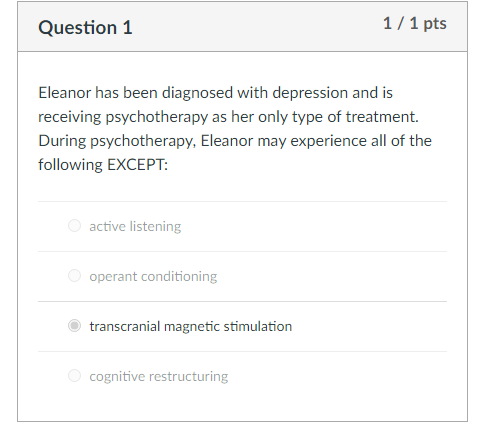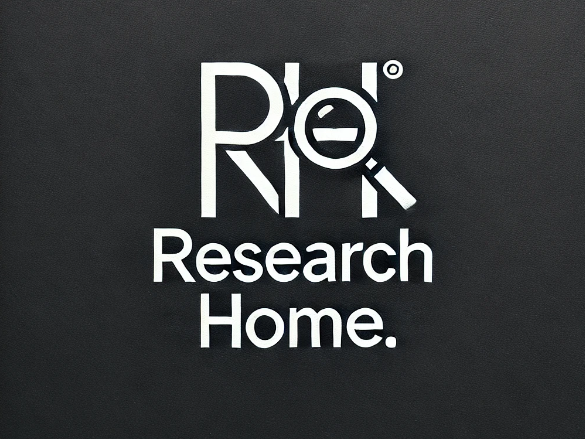Psychological Treatments-PSYC-101
Psychological Treatments
Question 1
Eleanor has been diagnosed with depression and is receiving psychotherapy as her only type of treatment. During psychotherapy, Eleanor may experience all of the following EXCEPT:
active listening
operant conditioning
operant conditioning
transcranial magnetic stimulation
cognitive restructuring
Question 2
involves interactions between a practitioner and client aimed at changing thoughts, feelings, and behaviors while reflects medical approaches to illness based on the notion that changing bodily processes will alleviate psychological disorders.
psychotherapy; cognitive therapy
biological therapy; cognitive therapy
biological therapy; cognitive therapy
biological therapy; psychotherapy
Question 3
Dallas believes that he will never be successful or likeable enough. His friends tell him that he is too hard on himself, but he is convinced that he will never live up to his own high standards. Because Dallas needs to replace his negative and unrealistic beliefs about himself with more realistic ones, he would most likely benefit from treatment that includes:
unconditional positive regard
psychoanalysis
cognitive restructuring
Shoshana is seeking a cost-effective therapy that will help her work on her social skills. She wants to practice with others while still having a supportive therapist. Shoshana should seek therapy.
humanistic
family
family
group
psychodynamic
Question 5
Harper is hyperactive in school. She often has trouble following instructions, sitting still in her seat, and focusing on her schoolwork. Harper is most likely to be treated with a , such as .
stimulant; Xanax
mood stabilizer; Adderall
mood stabilizer; Adderall
stimulant; Ritalin
mood stabilizer; Prozac
Question 6
Researchers use randomized clinical trials to determine the effectiveness and safety of therapeutic treatments. Which of these is the key element in this kind of research?
comparing the treatment one group gets with a control group condition to see if there is any difference in the results
testing the treatment on researchers before testing it on actual clients or patients, to ensure safety
including the treatment in a group of randomly chosen treatments and applying all of them to participants
performing the treatment trials in a clinical setting
Question 7
One of the most promising aspects of technology-based treatments for psychological disorders like addiction, depression, and anxiety is that they are:
training more people to become mental health service providers
cost-effective and can help more people than in-person psychotherapy can
better than in-person therapy, which will minimize the need for trained clinicians in the future
especially effective for the people who are most seriously affected by these conditions
Question 8
When evaluating whether a therapist is a good fit for you, which of the following factors is most important?the school where the therapist got his or her degree
that you feel they are trustworthy and caring when you meet with them
the therapist’s credentials (Ph.D. or M.A.)
the aesthetic design of their office
Because people with obsessive-compulsive disorder (OCD) have recurring intrusive thoughts and feel compelled to perform anxiety-reducing actions, the most effective treatment for OCD is:
exposure
cognitive-behavioral therapy
psychotropic medication
cognitive therapy
Question 10
Janice wants to overcome her fear of snakes. One therapist says she should get over it all at once and he suggest visiting pet store and holding alive snake until she no longer feels anxious. A second therapist suggests that she visualize a variety of increasingly scary snakes while trying to remain relaxed. To treat Janice’s phobia, the first therapist is suggesting , whereas the second therapist is proposing .
exposure and response prevention; modeling
systematic desensitization; exposure
systematic desensitization; exposure
modeling; exposure and response prevention
exposure; systematic desensitization
Question 11
In terms of alternative therapies for depression, some clients with mild to moderate depression respond well to , whereas clients with severe and difficult-to-treat depression may respond better to .
changes in their diets; phototherapy
regular aerobic exercise; phototherapy
regular aerobic exercise; electroconvulsive therapy
changes in their diet; electroconvulsive therapy
Question 12
Jared is suicidal. He has been seriously depressed for about a year and is saying that he wants to “end it all.” He has not responded to typical therapies. His psychiatrist believes it is critical to try something that will work as effectively and as quickly as possible. His psychiatrist will probably recommend:
a combination of selective serotonin reuptake inhibitors and lithium
electroconvulsive therapy
lithium
antidepressants and antipsychotics
Psychological Treatments-Question 13
When treating bipolar disorders, the drug lithium:
has side effects that intensify over time
is less effective than cognitive-behavioral therapy
is less effective than cognitive-behavioral therapy
is more effective than cognitive-behavioral therapy
should not be combined with other psychotropic medications
Kathleen has been diagnosed with borderline personality disorder and is seeing a therapist who is focused on reducing her radical behaviors, discussing her past traumatic experiences, and helping her to develop a sense of independence and self-respect. Kathleen’s therapist is most likely using:
phototherapy
dialectical behavior therapy
dialectical behavior therapy
operant procedures
psychotropic therapy
Question 15
Sean is receiving treatment for antisocial personality disorder. His therapist knows that treating Sean will be because Sean .
easy; has low self-esteem, which is easily fixed with cognitive therapy
impossible; views his problems as too overwhelming to treat
moderately difficult; may not respond to mood-stabilizing drugs
very difficult; will have difficulty developing a therapeutic relationship
Question 16
Troy, a six-year-old boy with autism, has received applied behavior analysis treatment for the past four years. Which of the following statements about Troy’s current situation is most likely to be true?
Troy’s cognitive skills have significantly improved, but he dislikes his treatment, so he has become defiant and difficulty
Troy’s treatment is relatively easy to implement, but his parents are thinking of dropping out because the treatment is so expensive
Troy’s treatment is relatively easy to implement, but his parents are thinking of dropping out because the treatment is so expensive
Troy’s treatment is very time-consuming and intense, but his IQ is now 20 points higher than when he started treatment
Troy is satisfied with his treatment and is a happier child, but his IQ is still low and her cannot be taught in normal classrooms at school
Question 17
During a counseling session, Lucy says, “My mother is such a jerk. She is always telling me what to do and will not let me do anything I want to do.” Her counselor responds with, “So you feel frustrated because your mother treats you like a child instead of an adult.” Lucy feels understood and is able to discuss other problems she is having.
(Use complete sentences when answering the questions)
1. With what type of therapy is Lucy being treated? (1 pt)
2. Explain what technique Lucy’s therapist is using in this situation. (1 pt)
3. What s the most important component of this therapy (in other words, what is the therapist trying to establish by using this technique)? (2 pts)
Answer Preview-Psychological Treatments-PSYC-101

$5.00
